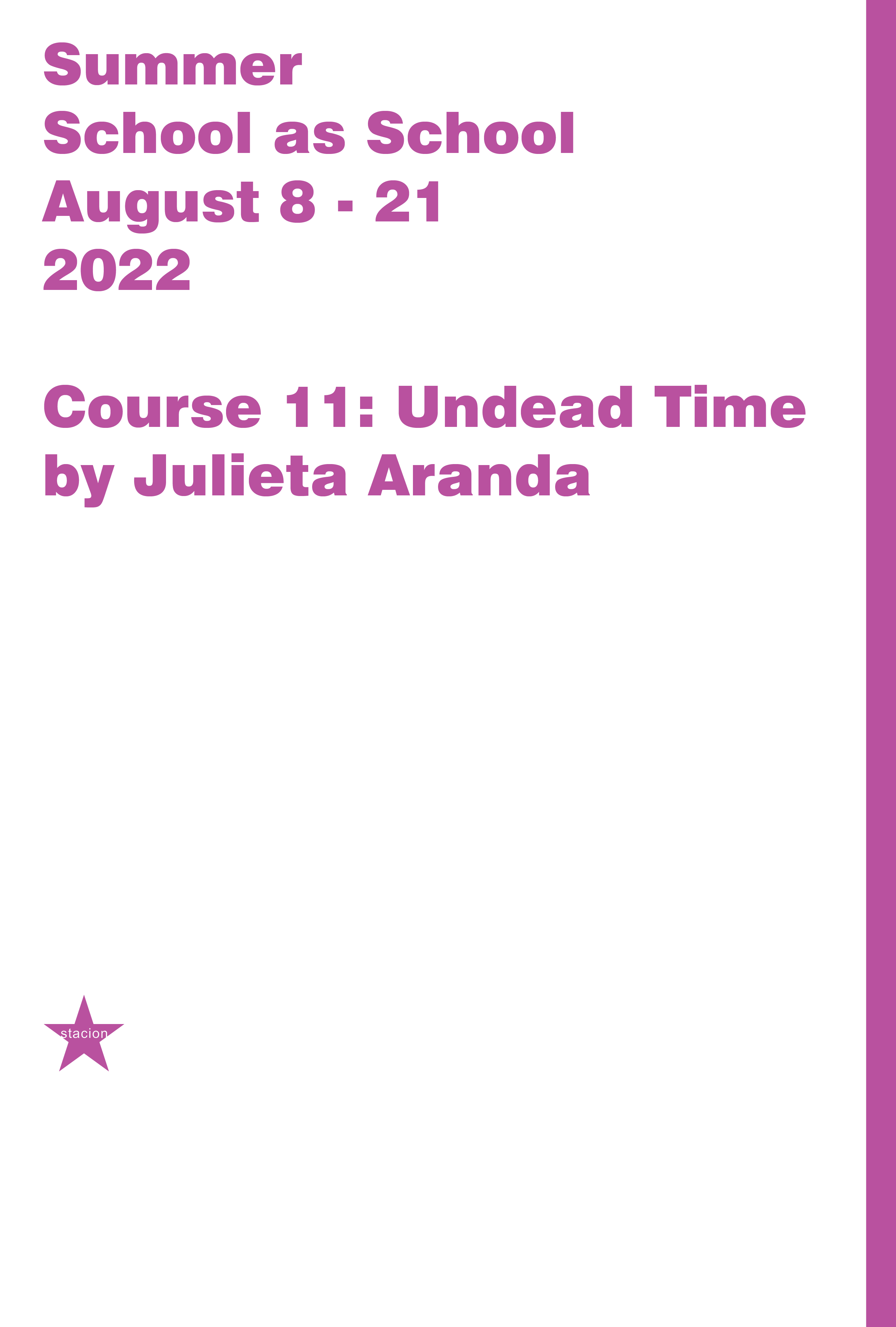
Course 11: Undead Time (virtual course)
by Julieta Aranda
15 – 20 August 2022
2 ECTS
Course Description
This seminar will take as a point of departure the unstable reality of landscapes haunted by industrial capitalism, and the seeming inevitability of collapse at every turn of the future. We will aim to understand the difference between apocalypse and extinction, and the forces that we set in motion when we try to use these concepts as the lights with which to illuminate the worlds which we inhabit.
The undead play a big role in apocalyptic imaginaries. But when it comes to recognizing that it is that we mean when we talk about the undead, it appears that we have lost sight of what is actually at stake in end time imaginings. Many worlds have already ended. Indigenous and previously enslaved peoples have long been living with apocalypse after terrifying encounters with human monsters.
“Apocalypse signals giving up on the future instead of committing to the difficult work of composing a better present,” in the words of Jeffrey Jerome Cohen. Instead of revelling in the horror of the apocalypse, Cohen suggests that we disentangle the undead from nightmares about the end times. We can embrace the undead as generative figures that illustrate aspects of the world that are needy of care.
Outside of the undead that are like us, there are the undead that we ourselves have created. Products of this consumer culture will outlive us, with a relentless haunting presence. All the novel entities that have been introduced into the world, ghost nets haunting the oceans, toxic spills, radium isotopes with a half-life decay of 1600 years, making buried bones glow in the dark. Pick up a piece of sun-bleached plastic from the shore. Peel the brittle flakes with your fingernail as if you were scraping a palimpsest, uncovering layers of meaning from this petroleum product that cannot die. Perhaps it is your own “fossil kin”—your own ancestor from the Paleozoic that has been unearthed, reanimated, and weaponized
Recognizing how we ourselves are becoming undead is an important first step as we contemplate reparative work that is urgently needed. It is easy to lumber along, unthinking, within a modern world that continues to generate wreckage in the name of progress. It is time to rethink how to care for our dead and our forgotten ancestors. We must rearticulate intergenerational cycles of life and death. It is important to advocate for responsibility in technology and design. We must learn to create and make things that can die.
Biography
In her artistic practice, Julieta Aranda (Mexico City, Mexico) composes sensorial encounters with the nature of time and speculative literature. She observes the altering human-earth relationship through the lens of technology, artificial intelligence, space travel and scientific hypothesis. Working with installation, sculpture, video and print media, she is invested in exploring the potential of science-fiction, alternative economies and the ‘poetics of circulation’. Her projects challenge the boundaries between subject and object while embracing chance encounters, auto-destruction and social processes.
Julieta Aranda‘s solo exhibitions have been held at Galería OMR, Mexico City, Portikus, Frankfurt, Francesco Pantaleone Arte Contemporanea, Palermo, New Museum, NY, Guggenheim Museum, NY, Museo d’Arte Contemporanea Villa Croce, and the Kunstverein Arnsberg amongst others. She has participated in numerous international group exhibitions including Fridericiaum Museum, Kassel, Bildmuseet, Umeå, Martin Gropius Bau, Berlin, Public Art Munich, Witte de With, Rotterdam and the Museum of Contemporary Art, Detroit. Julieta Aranda was part of documenta 13 in Kassel, and of the 10th Momentum Biennale, 12th Istanbul Biennale, VII Havana Biennale, 8th Berlin Biennale; the 56th Venice Biennale, the 2nd Moscow Biennale, the Liverpool Biennial and the 9th Lyon Biennale amongst others; and her work was exhibited in the Latin American pavilion at the 54. Venice Biennale.
As an editor of e-flux journal, and co-director of the online platform e-flux together with Anton Vidokle, Julieta Aranda has developed the projects Global Contemporary Travel, Time/Bank, Pawnshop, Supercommunity, and e-flux video rental, most of which started in the e-flux storefront in New York, and have traveled to many venues worldwide.
Participation
10 participants will be selected to participate in this course. Eligible participants must read the Terms information, fill out the application form, upload the required documents and submit the application form. Incomplete applications will not be considered.
The participation fee 300€.
Scholarships are available for participants from Kosovo.